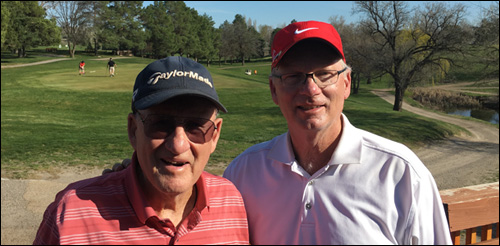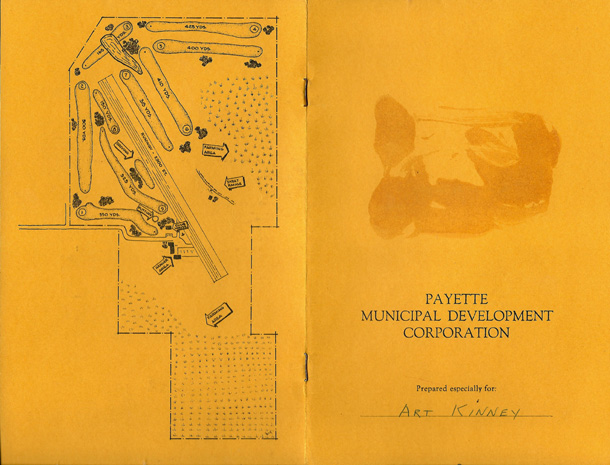From the pages of Pacific Northwest Golfer: Hometown Heroes
Civic pride and spirit of volunteerism, instigated by Cliff Masingill, built Idaho’s Scotch Pines Golf Course
by Rob Lundgren

The Greatest Generation weren’t only brave warriors on the battlefield and through the depths of the Great Depression. Many were also hometown heroes with an abundance of dreams and civic pride. Like Cliff Masingill of Payette, Idaho.
Masingill, along with a small group of other dedicated friends and family members, designed and built Scotch Pines Golf Course, one of southwest Idaho’s finer community courses. Cliff first proposed the idea of Payette having its own course back in 1960 while returning from a golf outing in Emmett, Idaho, a 45-minute drive each way.
“I didn’t like traveling back and forth to other places and thought we could make it work,” he recalled. “I thought it might be a good idea and I just kept talking it up.”
Within a matter of months, the Payette Municipal Development Corporation (PMDC) was formed and Cliff voted in as its president.
Cliff and his brother Tobe constructed a plaster-of-Paris model of the proposed golf course, which was put on display at a local bank. Money was raised thanks to a dance and a casino night. A $10,000 bank loan was also obtained and the project was off and running. The city of Payette had over 200 acres of undeveloped land north of town which was leased to the committee, which had to first clear the land of sagebrush and snakes, then figure out how to irrigate the high desert terrain adequately.
Luckily, Cliff’s father Tollie was in the pump business, but the work itself was time-consuming and often back-breaking anyway. An all-volunteer crew worked nights and weekends clearing land, digging trenches, and laying yards and yards of irrigation pipe.
“Some of the guys who helped didn’t even play golf, but they knew this would benefit the town,” recalls Cliff.
The PMDC consulted a supposed expert to help with the layout of the course, then rejected some of his ideas. Cliff remembers one incident to this day. “On the first hole the tee shot had to be short, then the next shot had to be a long carry over the reservoir. I can still hear my brother Tobe saying, ‘There isn’t another hole in existence worse than that one.'” Needless to say Cliff and company changed that.

By late 1962, “We were in a real rush to get the pipe and sprinklers in,” said Cliff. and they did in time for Scotch Pines’ first season in 1963 with approximately 50 members. Their design worked too, because seven holes today are virtually the same as they were originally laid out.
“I was very happy,” Cliff says with a big smile. “We thought if we had nine holes we had what we wanted.” But so many golfers started playing Scotch Pines that those thoughts had to be modified.
“We had guys fighting over tee times so we had to open our second nine,” he said. The second nine was opened for play in 1988, also built with volunteers, although the price tag was much higher than the original $35,000 that was spent on the original nine.
Cliff, now 89 years young, was asked about the town’s accomplishment and could it be done in today’s world. “It was worth it. I thought it would be good for the town,” he noted. “But there’s no way you could get the volunteers for this type of thing today.”
His son Scott agrees. “It’s a different world today,” says Scott, the nine-time Idaho State Amateur champion and 2003 inductee into the Pacific Northwest Golf Hall of Fame, and who now sits on the PNGA Board of Directors.
After serving 35 years as the president of the course’s board of directors, Cliff just plays golf these days either with his “over the hill gang” or with Scott and other family members. When he plays with his son, Cliff plays from the silver tees while Scott bangs away from the blues.
Both Masingills talked about their favorite sport. “It’s a neat sport health-wise if nothing else; I mean, look at me,” says Cliff.
“Such a diversity of ages can play,” Scott added. “Where else can you spend four hours with your dad, grandson, or daughter? It’s a great common bonding experience.”
Like his father before him, Scott is now currently the president of the course’s board of directors and is proud that Scotch Pines has kept to its original goal of welcoming all golfers regardless of age or skill level. “The golf course was designed so beginners can play it and it’s still that way,” he said. “We want to include everybody.”
He and other local residents have the members of the Greatest Generation to thank for that.
Rob Lundgren is a freelance golf writer in Meridian, Idaho.







